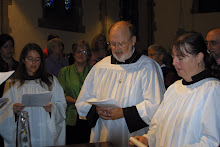Thursday, March 19, 2009
Director of DMin programs wanted
Wednesday, March 18, 2009
faculty updates from Gary Hall
Change is a daily event at Seabury. As we move forward with ambitious and exciting plans to reform what seminary means to us, to our faculty and staff, our students and the Church, many pieces are coming together to form a new whole. The Joint DMin program with our partner Church Divinity School of the Pacific is a reality. The announcement has been made to the Church and the world at large, and we are in the process of reviewing our first applications. We’ll welcome our first students in June 2009. Partnerships and strategic alliances with academic leaders such as Northwestern and Garrett are in final stages, with completed agreements just weeks away. And our first lecture for the spiritually and intellectually curious – both clergy and lay – was a gratifying success. More info about the event and a link to the video lecture is included in this month's Seabury Update email.
As the definition of our mission shifts, so does the shape of the faculty that will deliver on that mission. A traditional faculty with academic and theological leaders will evolve into a team of full and part time faculty. The concept of tenure will become long term contracts. Faculty will comprise an alliance of academic professionals – some from Seabury, others from CDSP or Northwestern University or Garrett as well as expert field practitioners– each respected for his or her accomplishments in an area particularly suited to our new offerings.
With change comes not just eager anticipation but sorrow. Many of the academic and theological leaders who have built Seabury’s reputation for excellence will be taking the next step in their outstanding careers. Ruth Meyers will join the faculty of CDSP in one of the Church’s and the nation’s most prestigious appointments – the Hodges-Haynes Professor of Liturgics. John Dally will move to a faculty position at Garrett as Visiting Associate Professor of Preaching and Missional Leadership – a role shaped specifically for John that will allow Garrett to take advantage his considerable gifts. Letters from John and Ruth and Gary's response. As we continue to develop creative and collaborative partnerships, we will remain in relationship with both Ruth and John as well as their new colleagues and communities.
But balancing our sorrow is the knowledge that the team that has guided much of our transition remains in place. Academic Dean Ellen Wondra has worked beyond tirelessly to mold the curriculum for the Joint DMin program with our partners at CDSP. Elizabeth Butler has driven the process of creating and realizing our vision for the new seminary. And Mark Miliotto has ensured that we stand on firm financial ground as we develop our plans. We all owe thanks to those who move on and those who will remain.
Gary Hall
Dean and President
Wednesday, March 11, 2009
Traces of the Trade reflections
what can you and I do? what can places like Seabury and other communities of faith and learning do?





